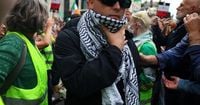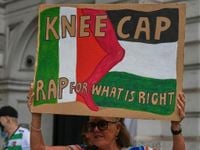On August 20, 2025, the usually quiet streets outside Westminster Magistrates’ Court in London buzzed with energy. Hundreds of supporters, some waving Irish and Palestinian flags, others holding bright green placards reading “Free Mo Chara,” gathered in anticipation. Their focus: Liam Óg Ó hAnnaidh, a 27-year-old member of the Irish rap group Kneecap, who was appearing in court charged with a terrorism offence for allegedly displaying the flag of Hezbollah, a proscribed organization in the United Kingdom, during a concert in November 2024.
Ó hAnnaidh, also known by his Anglicised name Liam O’Hanna and performing under the stage name Mo Chara, did not arrive alone. Flanked by his bandmates Naoise Ó Cairealláin (Móglaí Bap) and JJ Ó Dochartaigh (DJ Próvaí), as well as the band’s manager, he entered the court through a scrum of photographers and supporters. Wearing a keffiyeh scarf—a symbol closely associated with the Palestinian cause—Ó hAnnaidh was accompanied by an Irish language interpreter throughout the proceedings, underscoring the group’s deep ties to Irish identity and culture, as reported by Reuters and BBC.
The charge, brought in May 2025 under the Terrorism Act, alleges that Ó hAnnaidh displayed the yellow flag of Hezbollah on stage in a way that could arouse reasonable suspicion of supporting a proscribed organization. Prosecutors further accused him of holding up the flag while saying, “Up Hamas, up Hezbollah.” Kneecap, for their part, countered that the flag was thrown onto the stage during their performance, and they have consistently described the charge as a political move to silence their activism. According to the BBC, Ó hAnnaidh’s defense claims the prosecution is “political” in nature and intended to stifle the group’s outspoken views.
The legal wrangling in court centered on a technicality: whether the charge had been brought within the six-month time limit required by law. Ó hAnnaidh’s lawyers argued that he was formally charged on May 22, 2025—one day after the deadline. Prosecutor Michael Bisgrove, however, insisted that the charge was made on May 21, within the allowable window. The court spent three hours on this legal debate, with Chief Magistrate Paul Goldspring promising a decision on September 26, 2025. Until then, Ó hAnnaidh remains on unconditional bail, as he has been since his first appearance in June.
The day’s events were as much a spectacle outside the courtroom as within. Irish music played through speakers, and the atmosphere was more festival than legal proceeding. Supporters chanted “Free Mo Chara” and waved flags, while the Metropolitan Police imposed strict Public Order Act conditions, limiting where demonstrations could take place to prevent serious disruption. The band, in a statement reported by The Guardian, called the police restrictions “a calculated political decision” and a “distraction from war crimes that the British state supports.” They nevertheless urged their supporters to comply with all instructions, “irrespective of how pitiful.”
The controversy surrounding Ó hAnnaidh’s charge comes at a time of heightened tensions in the UK over demonstrations and support for banned organizations. Since the Palestine Action group was outlawed in early July 2025—following a break-in at a UK air force base that caused an estimated £7 million ($9.5 million) in damage—over 700 people have been arrested, mostly at protests. The ban on Palestine Action came days after the group claimed responsibility for the break-in, which they said was a response to the UK’s indirect military support for Israel during the ongoing war in Gaza, according to Al Jazeera.
Kneecap’s activism is no secret. The Belfast-based trio, who rap in both Irish and English, have long used their platform to amplify pro-Palestinian messages and advocate for the republican cause of uniting Northern Ireland with the Republic of Ireland. Since Ó hAnnaidh was charged, Kneecap has become even more vocal about the war in Gaza, which began in October 2023 and has, according to Al Jazeera, killed more than 60,000 people and left much of the enclave in ruins. In June 2025, the band led a 30,000-strong crowd at Glastonbury Festival in chants against UK Prime Minister Keir Starmer and accused Israel of committing war crimes—allegations Israel firmly denies.
Ó hAnnaidh himself has been forthright about his views. After leaving court to cheers from the crowd, he told supporters that the case was “a distraction from the real story” of Israel’s actions in the Palestinian territories. Speaking to the BBC, he said, “We know this story is more about me and more than Kneecap – this is a story about Palestine and us as a distraction from the real story.” The group’s stance has drawn both support and criticism, particularly after they displayed messages about Gaza during their set at the Coachella music festival in April 2025.
The case also highlights broader debates in Britain about the boundaries of protest, free speech, and the state’s response to activism. Since Hezbollah was banned in the UK in 2019, it has been a criminal offence to show support for the group. The Terrorism Act makes it illegal to display any article in a manner that could suggest support for a proscribed organization. For Kneecap and their supporters, the charge against Ó hAnnaidh is emblematic of what they see as increasing efforts to stifle dissent, particularly on issues related to Palestine.
Kneecap’s rise to fame has been meteoric. Formed in 2017, the group is known for their provocative lyrics and merchandise, often courting controversy. Their story even inspired a semi-fictionalized film starring Oscar-nominated actor Michael Fassbender, which won a British Academy of Film Award in February 2025. The band’s activism is not limited to the stage; in November 2024, they won a legal case against the UK government after then-minister Kemi Badenoch withdrew an arts grant, a decision later overturned in court.
Inside the courtroom, Ó hAnnaidh confirmed his name, date of birth, and address before legal arguments began. The public gallery was packed, and the hearing was conducted with an Irish language interpreter at his side. The defense, led by Brenda Campbell KC, argued that the Attorney General’s permission had not been secured when police informed Ó hAnnaidh of the charge on May 21. Prosecutors countered that such permission was only required at the defendant’s first court appearance. With the legal technicalities unresolved, the case was adjourned, and all eyes now turn to September 26, when Judge Goldspring will decide whether the prosecution can proceed.
As the crowd dispersed and the Irish music faded, the sense lingered that the case is about far more than one rapper or one flag. For Kneecap and their supporters, it represents a flashpoint in the ongoing debates over protest, free speech, and the politics of solidarity in the UK. For Ó hAnnaidh, the battle is not just legal—it’s a matter of principle, identity, and the right to speak out on global injustices.



